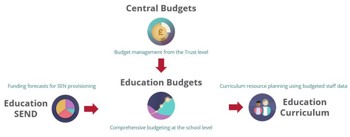 Access Education Budgets
Access Education Budgets
Five key benefits of centralisation for Multi-Academy Trusts
Centralising operational processes in multi-academy trusts can bring about multiple benefits.
In this article, we shed light on those benefits and introduce you to Access Central Budgets, a workspace-based tool that empowers MATs to efficiently manage and control various elements of Education Budgets from a central level, cutting down duplicated efforts across Trust sites.
Benefits of MAT centralisation: A real-life example
With the intention to seek more autonomy around curriculum, school budgeting and services, Perry Hall Primary School converted to an academy in 2013. Now six schools strong, Perry Hall Multi-Academy Trust enjoys the benefits of a centralised support team including a CEO, a facilities and estates manager and a strategic head of finance and business administration.
Prior to the introduction of a shared services team, endless time would be spent chasing different invoicing and administrative processes with a range of other barriers also in place. As the trust expanded, it quickly became obvious that the finance and business team needed to sit remotely and access one single cloud-based system to ensure efficiency.
Headed up by Jeremy Parkes, strategic head of finance and business administration, the business team is responsible for the preparation of financial information across all six sites, including annual budgets and forecasts, monthly management accounts, payroll, data analysis, procurement and weekly bank reconciliations. This central team also deals with HR contracts, operational queries and issues, marketing and communication and manages the trust’s statutory audit and internal audit programmes.
This story underpins a common theme amongst growing MATS: Centralisation can bring about numerous advantages as a strategic approach to reduce administrative workload and bring about increased visibility across an entire Trust.
Five benefits of MAT centralisation
Centralising administrative functions within a Multi-Academy Trust (MAT) yields numerous advantages that extend beyond individual academies. This section explores five key benefits that arise from the centralisation of management processes.
#1 Sharing the workload
Alongside the increased time spent on governance and accountability, schools take on a number of HR roles and responsibilities when converting to an academy or joining a trust. A central support team, sometimes referred to as a ‘shared services’ team, is designed to alleviate much of this added pressure from the individual schools and absorb the additional workload.
The introduction of a shared services team alleviated a number of administrative strains being placed on front office staff. This was important as we wanted to ensure the front office team were able to focus on their primary role – supporting the curriculum, teacher development and of course, pupil wellbeing and parental engagement.
#2 Managing performance
Ultimately, a headteacher should be allowed the necessary time to focus on improved learning, assessment structures and overall pupil and staff development while the shared services team oversees the administrative side of this.
If a member of staff is taken ill unexpectedly or on maternity leave, central support can deal with the administrative and financial aspect of the proceedings. This leaves the headteacher free to focus on supporting the individual in their day-to-day work, ensuring a consistently high educational offering for students.
One thing we are especially proud of is the improvements made to our absence reporting and management process. This became a major focus, as one school reported feeling let down by their local authority with regards to absence monitoring. In order to improve, the shared services team introduced a new process backed via software, implementing absence trigger meetings and return to work interviews – resulting in a reduction in staff absence rates.
#3 Assessing performance
As in any walk of life, tracking good performance and identifying areas of improvement is key. For central support teams overseeing a number of schools, a KPI sheet can highlight areas in need of development as well as examples of good practice. Having this information stored on a live database gives a single view and ensures the figures are both accurate and easily accessible for every school across the trust.
#4 Dealing with different local authorities
A maintained school will only ever deal with one local authority, meaning administrative and financial processes rarely change. Following a trust’s expansion, you may find yourself working closely with three or more different local authorities. From dealing with variations in paperwork processes to understanding discrepancies in the requirements of each local authority, the shared services team absorbs much of this additional work.
#5 Improved financial visibility
To take the pressure away from individual schools, trusts often employ a central finance team to take on the vast majority of back-office tasks. An experienced business support team will easily and efficiently cope with complex invoicing and order processes, alongside dealing with and managing supplier accounts.
This also helps the Trustees with consolidated information, providing full visibility of the entire trust’s financial performance and targets.
For many Trusts, individual academies will generate any required changes around payroll, such as additional hours claims, but the actual task and day-to-day management of the process is dealt with by shared services – improving efficiency across the trust.
Despite some nervousness around academisation and the centralisation of many formerly distributed functions, over time this has proved itself an efficient way to manage schools.
Introducing Access Central Budgets: providing a higher-level layer of centralisation across multiple establishments for MATs
Access Central Budgets is a pivotal component of the comprehensive Access Education Product Suite tailored for Multi-Academy Trusts (MATs).
Aligned with our promise of providing comprehensive budget planning and reporting tools at both Trust and Academy levels, Access Central Budgets offers a higher-level layer of centralisation across multiple establishments.
This powerful solution caters to the distinct requirements of Academy and Trust-level budgets, ensuring a two-way flow of real-time budget data for accurate and timely decision-making. The platform fosters a shared understanding by seamlessly integrating academy-level details through Access Education Budgets and providing consolidated, elevated views for the entire MAT.
In essence, Access Central Budgets facilitates efficient, informed financial management, allowing MATs to navigate budget complexities with clarity and confidence.
As part of the Access Education Product Suite, it works synergistically with modules like Access Education Curriculum and Access Education SEND, enabling optional integration for specialised forecasting needs in teaching resources and special education requirements.

Conclusion
Centralising administrative functions within MATs presents several advantages, as highlighted by the real-life example of Perry Hall Multi-Academy Trust. The benefits include:
- Sharing the workload
- Managing performance
- Assessing performance through key performance indicators (KPIs)
- Dealing with different local authorities
- Improving financial visibility
To further enhance centralisation, we have Access Central Budgets - a pivotal component of the Access Education Product Suite designed for MATs. This powerful solution provides a higher-level layer of centralisation, offering real-time budget data for accurate decision-making across multiple establishments.
Access Central Budgets, part of a comprehensive suite, synergistically integrates with other modules, such as Access Education Curriculum and Access Education SEND, to address specific forecasting needs in teaching resources and special education requirements.

 AU & NZ
AU & NZ
 SG
SG
 MY
MY
 US
US
 IE
IE

